Indicator Blu-rays: England in the ’60s
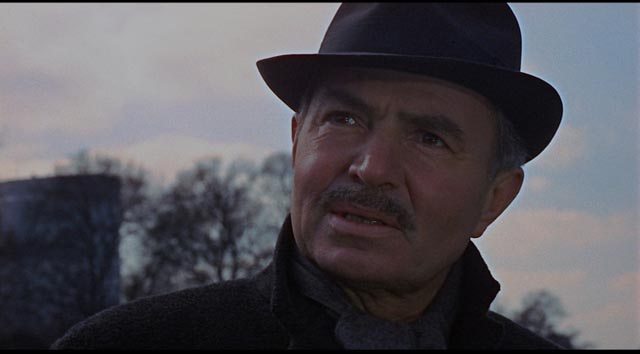
Although I was impressed by the Blu-ray of Sydney Pollack’s Castle Keep which I watched back in January, it has taken me a while to check out more releases from Indicator. This relatively new English label has already generated a substantial catalogue of Criterion-quality disks covering an eclectic range of titles, so it was difficult to settle on a particular handful when I got around to placing an order in early May. Or rather, there was one title I definitely wanted (The 5000 Fingers of Dr. T, which I wrote about here last week), while I needed to narrow down the selection of another four to keep the order manageable. I finally settled on two British films from the 1960s and two American movies from the early ’70s.
I hadn’t seen either of the former before, so started by watching them.
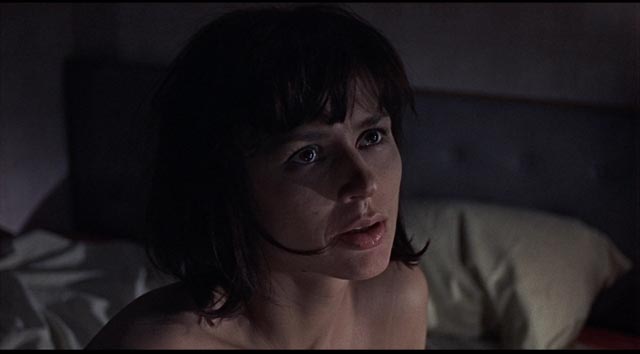
The Deadly Affair (Sidney Lumet, 1966)
Given Sidney Lumet’s stature as a major filmmaker, it seems odd that The Deadly Affair (1966) somehow fell through the cracks and remains one of his least known movies. This is doubly strange as it was adapted from a novel (the first, in fact) by John le Carré just a year after The Spy Who Came in from the Cold (1965), with a script by that film’s writer, Paul Dehn. But it turns out, perhaps not surprisingly, that Lumet was little concerned with the generic elements of the spy story, making instead a rather gloomy character study which almost incidentally inhabits the fringes of espionage.
In fact, Lumet seems to go out of his way to thwart viewer expectations – perhaps at least in part because by 1966 there was already a glut of spy movies on the market, dominated by both the burgeoning Bond franchise and a collection of grimmer anti-Bond movies like the Michael Caine/Harry Palmer series, The Quiller Memorandum and, of course, The Spy Who Came in from the Cold itself. To some degree, The Deadly Affair was prescient, looking forward to the exploration of moral ambiguities among drab bureaucrats in the television adaptation of le Carré’s Tinker Tailor Soldier Spy (1979) and Smiley’s People (1982).
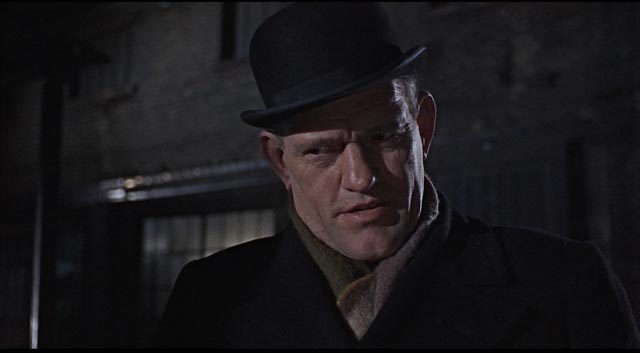
James Mason stars as Charles Dobbs, a rather colourless middle-aged employee of British intelligence (George Smiley in the book, the name had to be changed because of rights issues), whom we first meet in conversation with civil servant Samuel Fennan (Robert Flemyng) in a London park. For Dobbs it’s a routine interview prompted by an anonymous letter accusing Fennan of communist sympathies. The meeting is friendly and Dobbs is satisfied there’s no problem, but he later learns that Fennan has apparently committed suicide. The bureaucracy is satisfied to close the file quickly, but Dobbs is puzzled and suspects something more is going on, that in fact Fennan may have been murdered.
His intuition naturally proves correct and the deeper he digs, the more he displeases his bosses … and ultimately uncovers some truths which undermine his own sense of order. But this investigation is essentially a vehicle used by Dehn and Lumet to explore Dobbs’ character. And he’s not your typical spy hero. He’s in a deeply troubled marriage to Ann (Harriet Andersson), a woman he loves, and who seems to love him, although he is incapable of satisfying her sexually. She makes no effort to conceal her affairs, but always returns to him, and can’t let go even though it becomes clear that he’s impotent (with her), with suggestions that he may actually be repressing homosexual desires. His closest relationship in the movie is with retired policeman Mendel (Harry Andrews) and, most painfully, he has a deep attachment to Dieter Frey (Maximilian Schell), a younger man whom he ran as an agent during the war and who he now discovers is Ann’s latest lover.
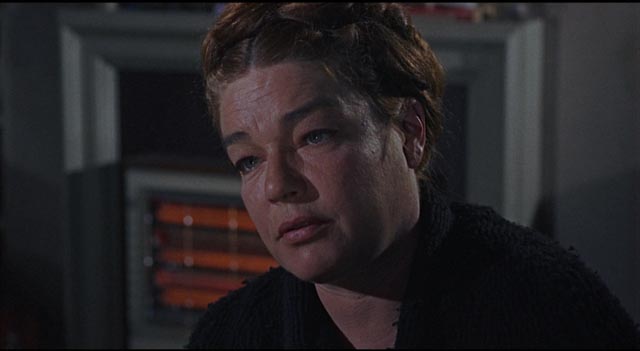
Dobbs’ complicated personal life is obliquely reflected in the marriage of Fennan to Elsa (Simone Signoret), a survivor of the Nazi camps who has been used and abused by life and is working for the Russians out of a mixture of fatalism and idealism. The threads of the thriller narrative are intricately woven through Dobbs’ personal life, resolved in the end with a sense of hopelessness and loss rather than triumph. The Deadly Affair is not a rousing thriller, but rather a bleak and exhausted drama. Although skilfully structured by Dehn, efficiently directed by Lumet and superbly acted by an impressive cast, it’s not surprising that it wasn’t exactly a hit when released, but given its quality it is surprising that it hasn’t resurfaced before as one of Lumet’s most interesting films of the ’60s.
The image on the disk reflects a key stylistic choice made by Lumet and cinematographer Freddie Young. Lumet, uncomfortable with the use of colour (his first colour film was The Group, made the same year just before The Deadly Affair), had wanted to shoot in black-and-white, but distributor Columbia vetoed that, so Young used pre-flashing to desaturate the colour and mute the contrast (a technique best known from Vilmos Zsigmond’s work with Robert Altman in the early ’70s, particularly McCabe & Mrs. Miller and The Long Goodbye); this gives the film a drab, dank look which evokes a perpetually rain-soaked world of suppressed emotions.
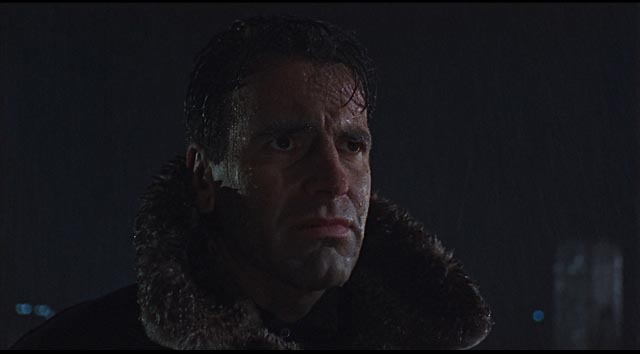
The extras include an informative commentary from film historians Michael Brooke and Johnny Mains; an audio recording of James Mason at the National Film Theatre from 1967 (48 minutes); a Guardian Lecture by Sidney Lumet from 1983 (89 minutes); a brief piece on the film’s London locations (4:03); a brief interview with camera operator Brian West (4:58); and an interesting account by David Kipen of Paul Dehn’s life and the intersection of his career in British intelligence with his work in the movies (16:52). There’s also a trailer (2:33) which struggles to find a way to sell the film.
*
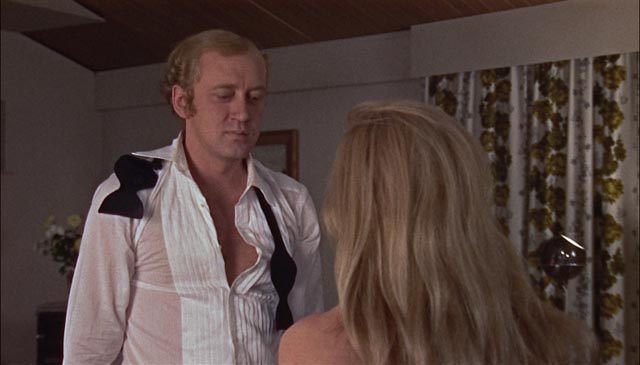
The Reckoning (Jack Gold, 1969)
Jack Gold was one of a generation of filmmakers who emerged from BBC documentary and drama in the early-to-mid-1960s, but he never achieved the stature of a Ken Loach, a Ken Russell or an Alan Clarke. Like Clarke, he spent most of his career in television production with an occasional theatrical feature thrown in, but his body of work doesn’t cohere around a clearly discernible personal image. A skilled craftsman and director of actors, Gold seems more like a studio journeyman than an auteur – which is not meant as a put-down. Although I’ve only seen a limited number of his films, I’ve liked them – even the ones which didn’t get a very good critical reception, like Who? (1974), an adaptation of an Algis Budrys sci-fi novel, and The Medusa Touch (1978), a mixture of disaster film, murder mystery and supernatural horror centred on a particularly ripe Richard Burton performance.
After five years of television work, Gold launched his spotty theatrical career with a pair of features written by playwright John McGrath – The Bofors Gun (1968) and The Reckoning (1969) – both starring Nicol Williamson. I saw and was impressed by The Bofors Gun on TV years ago and it’s high on my list of movies way overdue for restoration and rediscovery, but I’d never seen The Reckoning until I got the Indicator Blu-ray. Watching it has only increased my desire to see The Bofors Gun again.
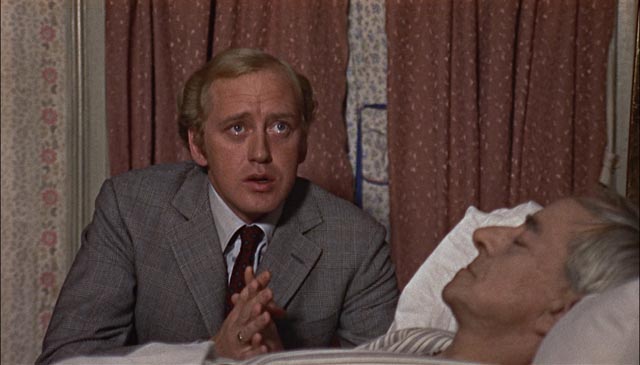
As has been pointed out by many before me, there are structural similarities between The Reckoning (based on a novel by Patrick Hall) and Mike Hodges’ Get Carter (1971, from Ted Lewis’ novel); in both, a tough character from the North of England who has been making his way in London returns home because of a death in the family, only to find himself caught between worlds and put in a position of resolving conflict through violence. The better-known Get Carter benefits commercially from being embedded in the gangster genre; its characters and action are both justified and made comprehensible by genre expectations. The Reckoning is a trickier proposition, a drama of class and culture conflicts in which a man lashes out in anger because his sense of personal identity is being torn in multiple directions.
Mick Marler (Williamson) was born displaced, the son of a working class Irish family in Liverpool. Having managed to break away from his roots, he has made a life in London – married to the middle-class Rosemary (Ann Bell), working his way up the corporate ladder in the sales department of a business machines company – where he has managed to conceal the fact that he’s Irish from everyone … except his wife, of course, who looks down on his family although she’s both attracted and repelled by his capacity for crudeness and violence.
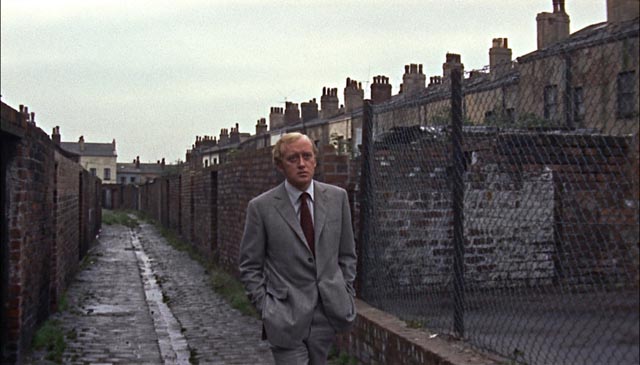
In the middle of dealing with office politics – he is skilled at manipulating his insecure boss in the sales department – he gets a call from home that his father has had a heart attack. Finishing a report his boss needs, he briefly delays driving home only to discover that his father has just died. And not only that, but that there was more to it than a heart attack; his Da was beaten by some young thugs in a pub who objected to him singing a song about an IRA man murdered by the British. While juggling the demands of work and the business of a family funeral, Mick tries to find out who killed his father as the police and coroner dismiss it as a natural death.
Reconnecting with his mother and sister, reminded of his own origins from which he has long been estranged, Mick is disgusted by his middle-class life back in London; he gets drunk and makes a spectacle of himself at a large party thrown by his wife. He sings the same song his father sang at the pub and one of his company directors, a guest at the party, says rather contemptuously “I had no idea you were Irish.” Mick decks him and kicks everyone out of the house; Rosemary leaves him and he’s facing the end of his career at the company … but first he heads back to Liverpool and the funeral. A friend of his father’s has pointed out the scrawny young man who kicked his father in the head and Mick kills him in the pub parking lot after creating an alibi for himself.
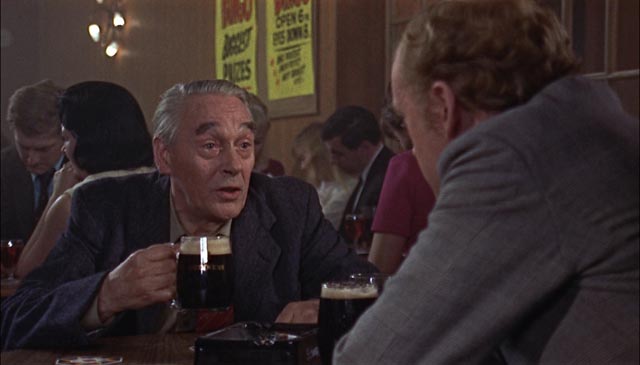
Although he’s a suspect, the police have no evidence and he returns to London where he’s able to sabotage his boss, deflect the trouble resulting from assaulting the director at the party, and land a promotion for himself. The self he has created from disparate parts – his tough Irish origins, his manufactured middle-class businessman persona – fits perfectly into the cutthroat pre-Thatcher capitalist environment of England at the end of the Swinging ’60s, but it’s fuelled by a reckless anger which in turn arises from a hollowness at its centre. His survival and success paradoxically makes the ending bleaker and more disturbing than the violent conclusion of Get Carter.
Seen today, more problematic than the conflation of corporate conflicts and personal violence, is Mick’s relationship to the various women in the story – Rosemary, who responds positively to rough treatment; Joyce Eglington (Rachel Roberts), a woman who pretty much throws herself at him back in Liverpool; and Hilda Greening (Zena Walker), his boss’ secretary, who supplies him with enough information to sabotage the man and take his job. Mick, a brutal alpha male, seems irresistible to women and uses and exploits them to his own advantage, while not really offering them anything much in return. As a character, there’s something satisfying about his ability to manipulate his world and the people who inhabit it, but as a human being he’s quite appalling. Nicol Williamson inhabits this monster spawned by class conflict with such intensity that The Reckoning is exhilarating while it lasts, but troubling in retrospect.
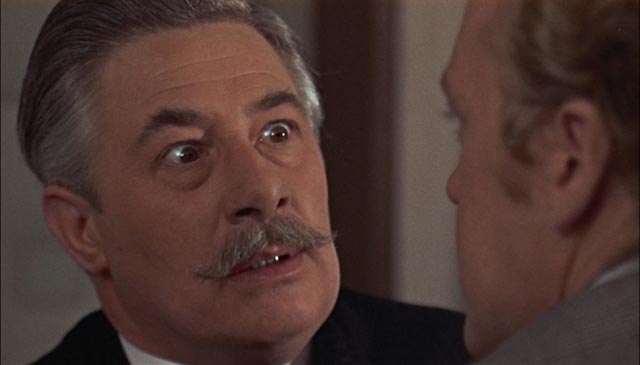
Directed with unfussy assurance, the film paints a portrait of a divided England very much like the one in Get Carter, but with corporate businessmen in place of gangsters. The grim depiction of the working class North, the bleak row houses dominated by an ugly industrial landscape, is another world, with no apparent connection to the impersonal suburban street where Mick and Rosemary live; Mick, as an Irishman, stands outside both, remaining alienated, a sleeper agent burrowed by sheer force of will into the complacent privilege of the English bourgeoisie, a harbinger of chaos whose presence coincides by chance with the beginnings of the Troubles which would see England under violent attack by the IRA throughout the ’70s.
The disk includes three extras; two very brief interviews – with actor Tom Kempinski (3:08), who plays Marler’s friend Brunzy, and second assistant director Joe Marks (3:56); and a longer piece with writer Matthew Sweet (19:35), who discusses the film’s origins and the cultural climate from which it emerged.
Comments